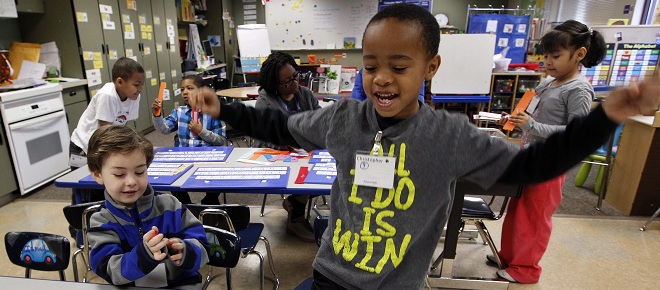How to debate a four-day school week
Tease the day: School boards across the country have mature conversations about kids’ schooling
AP Photo/Elaine Thompson
Share

The House of Commons is empty this week, its usual occupants spending a week away from the chamber. Decorum in the Commons of late has set no new records for rancour, nor acrimony. But neither have parliamentarians proven able to make ideas the fulcrum of their deliberations. The opposition and government spent the last week barking at each other about Senate transparency, accountability and reform. Those yelling matches might have spawned a continuing, and useful, national debate about the future of the red Chamber, but the ideas now filling that conversation are noticeably not emanating from the House.
Ideas, and useful conversations about them, are all over the place. The National Post features a thoughtful look at the Fort McMurray public school board’s consideration of a four-day school week. The reality in the northern Alberta town, say the plan’s proponents, is that taking a Friday away from school makes a lot of sense: kids travel great distances for weekend sports, and are often absent on the last school day, for example. The city’s Catholic school board has already moved in that direction.
The Post outlines a number of Canadian examples of flexible school boards that play around with schedules: one has implemented a year-round school year; another gives a week off so kids can help with the annual potato harvest. The story features no fulmination and no outrage, only considered dissent. The parents, school boards and researchers cited make it seem so easy to be so mature, even with such important people—children—at stake. That’s a debate I can get behind.
What’s above the fold this morning?
The Globe and Mail leads with imminent challenges facing B.C. Premier Christy Clark (a budget) and Ontario Premier Kathleen Wynne (a Throne speech). The National Post fronts the Charbonneau Commission’s difficulty squeezing testimony out of a contractor nicknamed Mr. Sidewalk. The Toronto Star goes above the fold with Wynne’s expected conciliatory approach during today’s Speech from the Throne. The Ottawa Citizen leads with a new poll that has the vast majority of Canadians unhappy with the Senate’s status quo. iPolitics fronts Treasury Board President Tony Clement’s oversight of Ontario’s “Ring of Fire” resource development. CBC.ca leads with the case against accused murderer and Paralympic superstar Oscar Pistorius. National Newswatch showcases a Saskatoon Star-Phoenix story in which Senator Pamela Wallin’s family defends her residence in the prairie province.
Stories that will be (mostly) missed
| 1. Oil sands. A federal-provincial plan to monitor the oil sands and broadcast the sector’s impact on the environment hasn’t gotten off the ground, but may by the end of February. | 2. School weeks. Fort McMurray’s public school board is considering a four-day school week, just the latest Canadian example of flexible schedules to accommodate regional needs. |
| 3. Systemic racism. Canada’s new mandatory minimum sentences will undergo a test at the Ontario Court of Appeal when lawyers allege the justice system unfairly targets black men. | 4. Plastics. Some of the world’s most harmful plastics should be declared hazardous materials as a means of cutting down on their proliferation, argue writers in the journal Nature. |